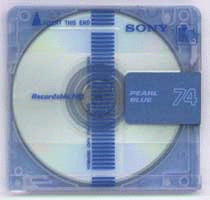Explore
the origins
of minidisc
how to buy
into the product
and what
to buy
plus where
now?
Reviews
Sony MZR50
Sharp MS 701/2
Mini Reviews
Awia AM-R10
Panasonic SJ-MJ70
Panasonic SJ-MR100
Sharp MS722
Sharp MT821
Sony MZR55
 |
|
| INTRODUCTION & HISTORY | |
It's a disc, and it's mini. That about sums it up then. Well, in a short sentence it does, but there's much more to this amazing product. Firstly, lets get one thing straight: it's not a replacement for the CD (that's here to stay for a long time to come (or until they think up the next thing)), it is in fact a replacement for that hissing, degrading sound quality, ancient format know as tape. Now no longer will you have to suffer to the prehistoric compact cassette, instead there's excellent sound quality (just as good as a CD despite what people say, but more about that later), perfect reproduction every time and instant access, all this in a sexy, small, durable MiniDisc.
|
|
 MiniDiscs
themselves were first chucked out of the
production line by Sony (who invented/pioneered
the format) in 1992. This digital disc based
medium (basically a mini CD) is available in
pre-recorded (although the selection of albums is
restricted) and blank recordable discs (which
remember is it's main purpose). They give so
called 'near CD' quality sound because they use a
compression method know as ATRAC, which
compresses and throws away parts of the sounds
that use humans can't hear- although hi-fi
purists do claim they can tell the difference
(which is disputable), everyone else can't
(including me). The cute little disc itself sits
inside an enclosed cartridge (as seen right) and
is about 7cm by 7cm, with the recordable types
being able to be recorded on as many times as
like, without any loss of sound quality. The only
real draw back with these titchy discs is that
you can't make a perfect copy of another MiniDisc
because of the cycle of decompression and
compression (like JPEG's (if you know what I
mean)). But I'm sure you could all live with that
because of all its advantages!
MiniDiscs
themselves were first chucked out of the
production line by Sony (who invented/pioneered
the format) in 1992. This digital disc based
medium (basically a mini CD) is available in
pre-recorded (although the selection of albums is
restricted) and blank recordable discs (which
remember is it's main purpose). They give so
called 'near CD' quality sound because they use a
compression method know as ATRAC, which
compresses and throws away parts of the sounds
that use humans can't hear- although hi-fi
purists do claim they can tell the difference
(which is disputable), everyone else can't
(including me). The cute little disc itself sits
inside an enclosed cartridge (as seen right) and
is about 7cm by 7cm, with the recordable types
being able to be recorded on as many times as
like, without any loss of sound quality. The only
real draw back with these titchy discs is that
you can't make a perfect copy of another MiniDisc
because of the cycle of decompression and
compression (like JPEG's (if you know what I
mean)). But I'm sure you could all live with that
because of all its advantages!